Unit9 Have you ever been to a museum
unit9haveyoueverbeentoamuseum知识点梳理及单元复习
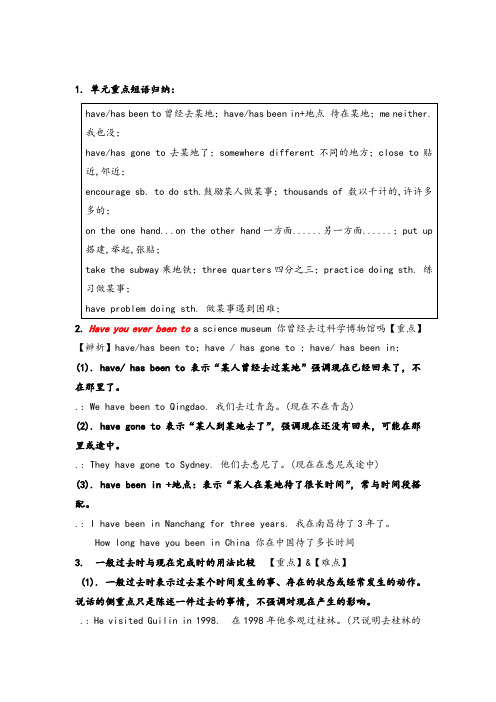
1. 单元重点短语归纳:2. Have you ever been to a science museum 你曾经去过科学博物馆吗【重点】【辨析】have/has been to;have / has gone to ;have/ has been in;(1). have/ has been to 表示“某人曾经去过某地”强调现在已经回来了,不在那里了。
.: We have been to Qingdao. 我们去过青岛。
(现在不在青岛)(2). have gone to表示“某人到某地去了”,强调现在还没有回来,可能在那里或途中。
.: They have gone to Sydney. 他们去悉尼了。
(现在在悉尼或途中)(3). have been in +地点:表示“某人在某地待了很长时间”,常与时间段搭配。
.: I have been in Nanchang for three years. 我在南昌待了3年了。
How long have you been in China 你在中国待了多长时间3. 一般过去时与现在完成时的用法比较【重点】&【难点】(1). 一般过去时表示过去某个时间发生的事、存在的状态或经常发生的动作。
说话的侧重点只是陈述一件过去的事情,不强调对现在产生的影响。
.: He visited Guilin in 1998. 在1998年他参观过桂林。
(只说明去桂林的时间)(2). 现在完成时表示动作发生在过去,对现在造成了影响或产生了结果。
不能与确定的过去时间状语连用。
.: Jill has bought a new computer. 吉尔买了一台新电脑。
I have taught here for fifteen years. 我在这儿教学已经15年了。
I have seen the film. 我看过这部电影。
(我了解这部电影的内容)I saw the film last week. 我上周看了这部电影。
人教新目标英语八年级下册讲义—Unit 9 Have you ever been to a ……

新目标八年级下册Unit 9 Have you ever been to a museum ?讲义一、重点单词1. amusement n. 娱乐; 游戏2. somewhere adv. 在某处; 到某处3. camera n. 照相机; 摄影机; 摄像机4. invention n. 发明物5. invent v. 发明; 创造1. unbelievable adj. 难以置信的; 不真实的2. progress n. 进步; 进展3. rapid adj. 迅速的; 快速的4. unusual adj. 特别的; 不寻常的5. toilet n. 坐便器; 厕所6. encourage v. 鼓励7. social adj. 社会的8. peaceful adj. 和平的; 安宁的9. performance n. 表演; 演出10. perfect adj. 完美的; 完全的11. itself pron.(it的反身代词) 它自己12. collect v. 收集; 采集13. German adj. 德国的; 德语的; 德国人的n. 德语; 德国人14. theme n. 主题15. ride n. 供乘骑的游乐设施; 短途旅程16. province n. 省份17. simply adv. 仅仅; 只; 不过18. fear v. & n. 害怕; 惧怕19. whether conj. 不管......;还是); 或者......(或者); 是否20. Indian adj.印度的 n. 印度人21. Japanese adj.;日本的; 日本人的; 日语的n. 日本人; 日语22. equator n. 赤道23. whenever conj. 在任何......时候; 无论何时24. spring n. 春天25. mostly adv. 主要地; 通常26. location n. 地点; 位置二、短语归纳1.at night在夜晚2.in a more natural environment在一个更加自然的环境中3.all year round 全年4.be far from 离……远5.in the dark 在黑暗中6.in the past 在过去7.have been to sp. 去过某地8.science museum 科学博物馆9.history museum 历史博物馆10.amusement park 游乐园11.go somewhere different 去不同的地方12.go skating 去滑冰13.take the subway 坐地铁14.a great way to spend a Saturday afternoon一个过周六下午的好方法15.all the old movie cameras所有的古老的电影摄影机16.learn about sth.解有关……的情况17.on the weekend 在周末18.camp in the mountains 在大山里露营19.put up a tent搭帐篷20.in such a rapid way 以如此迅猛的方式21.different kinds of各种各样的22.development of toilets 厕所的发展23.social groups 社会团体24.the tea art performances茶艺表演25.make a perfect cup of tea with beautiful tea sets用漂亮的茶具沏一杯完美的茶26.a nice place to enjoy tea 一个品茶的好地方27.thousands of 数以千计的28.International Museum of Toilets国际厕所博物馆29.the Terracotta Army 兵马俑30.Southeast Asia东南亚31.Night Safari 夜间动物园32.three quarters 四分之三33.an English-speaking country一个讲英语的国家34.have problem doing sth. 做某事很困难35.during the daytime在白天36.a couple of times 好几次37.right now 现在;目前38.an amusement park with a special theme一个有特别的主题的游乐园39.walk around the park 在公园里到处走40.hear of 听说41.take a ride兜风42.another province另一个省43.the Bird’s Nest鸟巢44.encourage sb. to do sth.鼓励某人做某事45.on the one hand... on the other hand.一方面,另一方面三、句型集萃1.a great way to do sth一个做某事的好办法2.It’s unbelievable that很难相信……3.watch sb do sth.看某人做了某事4.encourage sb to do sth鼓励某人做某事5.as..as和。
Unit 9 Have you ever been to a museum? 学习任务单
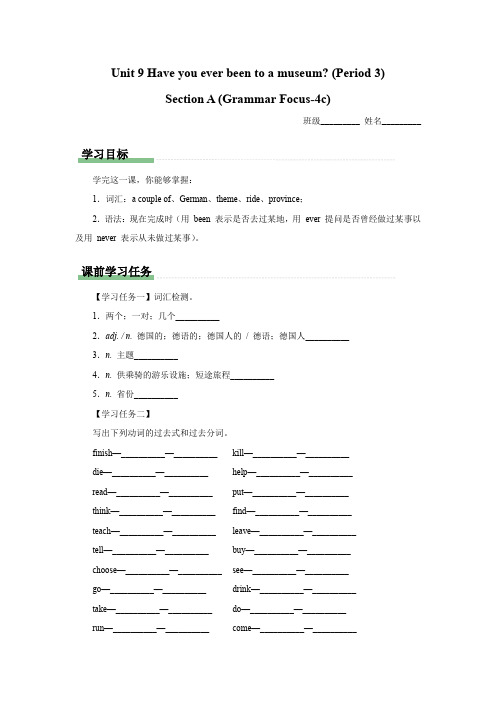
Unit 9 Have you ever been to a museum? (Period 3)Section A (Grammar Focus-4c)班级_________ 姓名_________学习目标学完这一课,你能够掌握:1.词汇:a couple of、German、theme、ride、province;2.语法:现在完成时(用been 表示是否去过某地,用ever 提问是否曾经做过某事以及用never 表示从未做过某事)。
课前学习任务【学习任务一】词汇检测。
1.两个;一对;几个__________2.adj. / n. 德国的;德语的;德国人的/ 德语;德国人__________3.n. 主题__________4.n. 供乘骑的游乐设施;短途旅程__________5.n. 省份__________【学习任务二】写出下列动词的过去式和过去分词。
finish—__________—__________kill—__________—__________die—__________—__________help—__________—__________read—__________—__________put—__________—__________think—__________—__________find—__________—__________teach—__________—__________leave—__________—__________tell—__________—__________buy—__________—__________choose—__________—__________see—__________—__________go—__________—__________drink—__________—__________take—__________—__________do—__________—__________run—__________—__________come—__________—__________【学习任务三】找出本单元Section A 中含有现在完成时的句子。
人教版新目标Unit9_Have_you_ever_been_to_a_museum全单元

TALK
neither have I = me neither .
I have been to the zoo a lot of times. 答语
______________ .\
. ( 我也是)
I’ve never been to a water park. 答语
____________ \ _______ . ( 我
• 1 h过某地(去过已回来);
• 2 have / has gone to +地名 去了某地(还没回来);
• 3 have / has been in +地名 在某地住了有多长。
• A: Have you ever been to the Great Wall? • B:Yes, I have. What about you? • A: Me too. • =So have I. • =I have ever been there, too. • So+助动词/be动词/情态动词+主语.
4. A: How about __g_o_i_n_g___ (go) to the art museum? There are some special German paintings there right now.
B: Sure. When do you want _t_o_g_o___ (go) ? 5. A: Have you ever __v_is_i_te_d___ (visit) the
• A: Have you ever been to the Great Wall? • B: No, I haven’t. What about you? • A: Me neither. • =Neither have I. • =I haven’t been there, either. • Neither+助动词/be动词/情态动词+主语.
人教版英语八下U9Have you ever been to a museum 讲义

Unit9 Have you ever been to a museum?一、重点词汇及拓展1. amusement n. 娱乐;游戏e.g. The old ladies played the games just for amusement.老太太们玩这个游戏只是为了取乐。
amuse v. 消遣,逗笑;使开心,使愉快amusing adj. 有趣的,好玩的,好笑的amused adj. 被逗乐的;感到好笑的2.amusement park 游乐场e.g. The amusement park is open from May through October.游乐园从五月到十月开放。
3.somewhere adv. 在何处;到某处pron. 某个地方e.g. Maybe the keys are somewhere in the dining room.也许钥匙在餐厅某个地方。
I need to find somewhere to stay tonight.我得找到今晚要住的地方。
4.camera n.照相机;摄影机;摄像机e.g. I heard your parents bought you a cameras as a gift.我听说你的父母亲给你买了一台照相机作为礼物。
5.invention n.发明;发明物e.g. Do you think mobile phone is a great invention?你认为手机是一个伟大的发明吗?6.invent v.发明;创造inventor n.发明家invention n.发明;发明物e.g. As we all know that Edison invented light bulb.我们都知道爱迪生发明了灯泡。
7. unbelievable adj. 难以置信的;不真实的unbelievably adv. 难以置信地;不真实地unbelievably bad/good 坏得/好得令人难以置信incredible adj. 难以置信的e.g. I still find this story both fascinating and unbelievable.我仍然觉得这个故事非常有趣和难以置信。
(完整版)优秀课件unit-9-Have-you-ever-been-to-a-museum

zoo
A: Have you ever been to a zoo? B: Yes, I’ve been to a zoo.
space museum 太空馆
A: Have you ever been to a space museum? B: No, I’ve never been to a space museum.
6.He has been in London for half a month. 他来伦敦已有半个月了。
1.sb.have /has been to sp. 意为“某人曾经去过某地”,
但现在已不在那里了, ”已经回来,侧重指经历,后 可接次数, 如once, twice, three times等, 表示 “去过某地几次”, 也可和 just, never, ever等连用。
4.我了解了一些电影的知识。 I _le_a_r_n_e_d_a_b_o_u_t_ some information about movie. 5.他的粗心导致了这次失败。 His carelessness _l_e_d_ _t_o_ this failure.
选用have, has填空: 1.I __h__a_v_e_ told him the news. 2.She ___h_a_s___ come back from school. 3.You ___h_a_v_e__ won the game.
2.sb.have/has gone to sp.
意为“某人已经去某地了”, 可能在去某地的路上, 也可能到达了某地。总之, 说话时该人不在现场, 一般不用第一人称、第二人称代词作句子的主语。
3.sb.have/has been in sp.
表示“在某地呆了多少时间”, 常与时间段状语连用
Unit-9--Have-you-ever-been-to-a-museum--知识整理
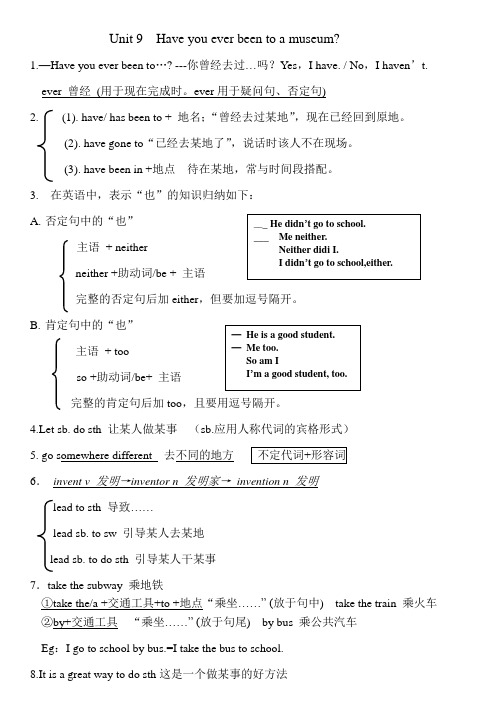
Unit 9 Have you ever been to a museum?1.—Have you ever been to …? ---你曾经去过…吗?Yes ,I have. / No ,I haven ’t. ever 曾经 (用于现在完成时。
ever 用于疑问句、否定句)2.(1). have/ has been to + 地名;“曾经去过某地”,现在已经回到原地。
(2). have gone to “已经去某地了”,说话时该人不在现场。
(3). have been in +地点 待在某地,常与时间段搭配。
3. 在英语中,表示“也”的知识归纳如下:A. 否定句中的“也”主语 + neitherneither +助动词/be + 主语 完整的否定句后加either ,但要加逗号隔开。
B. 肯定句中的“也”主语 + tooso +助动词/be+ 主语 完整的肯定句后加too ,且要用逗号隔开。
4.Let sb. do sth 让某人做某事 (sb.应用人称代词的宾格形式)5. go somewhere different 去不同的地方 6. invent v 发明→inventor n 发明家→ invention n 发明lead to sth 导致……lead sb. to sw 引导某人去某地lead sb. to do sth 引导某人干某事7.take the subway 乘地铁①take the/a +交通工具+to +地点“乘坐……” (放于句中) take the train 乘火车 ②by+交通工具 “乘坐……” (放于句尾) by bus 乘公共汽车Eg :I go to school by bus.=I take the bus to school.8.It is a great way to do sth 这是一个做某事的好方法9. go skating 去滑冰10. .on the weekend 在周末11. science museum 科学博物馆history museum 历史博物馆12.all the old movie cameras所有的古老的电影摄影机13.camp in the mountains 在大山里露营14.learn about 了解获知,得知learn about sth.了解有关……的情况15. an amusement park 一个游乐场16. the International Museum国际博物馆17. put up a tent 搭帐篷put up 搭起;举起;张贴rmation信息;资料(不可n.)some informationa piece of information 与about 连用,表示:“关于……的信息”19.It’s unbelievable that+从句“令人难以置信的……”20. make progress 取得进步make progress in 在......方面取得进步21.in such a rapid way 以如此迅猛的方式22.play chess 下棋23.be able to+V原能够做某事24.in the future在将来25.wonder 想要知道= want to know①后接从句eg:I wonder who she is.②也可接“疑问词+不定式”eg: I wonder what to do next.26.I couldn’t believe my eyes我无法相信我的眼睛。
八下新目标英语Unit_9_Have_you_ever_been_to_a_museum?

【2012贵州贵阳】 “Have you ever been to Tokyo?” “Yes, I ______ there twice. It’s a modern city.”
A. have gone B. have been C. had gone
【答案】B
考查动词时态及动词的用法。问句用的是现 在完成时,答句也应该用现在完成时,前后 时态一致。have gone意为“去过,但还没回 来”;have been意为“去了,回来了”。根 据句意:你去过东京吗?我去过两次,它是 一个现代城市。故选B.
the final.
— I think so. He ________ for it for months.
A. is preparing
B. was preparing
C. had been preparing
D. has been preparing
2. By the time he realizes he _________ into a
D. Did; show
8. — Hi, Tracy, you look pale.
— I am tired. I ______ the living room all day.
A. painted
B. had painted
C. have been painting D. have painted
C. considered D. is going to consider
7. —______ you ______ him around the museum
yet?
—Yes. We had a great time there.
A. Have ; shown
人教版八年级英语下册Unit9 Have you ever been to a museum知识点梳理及单元复习
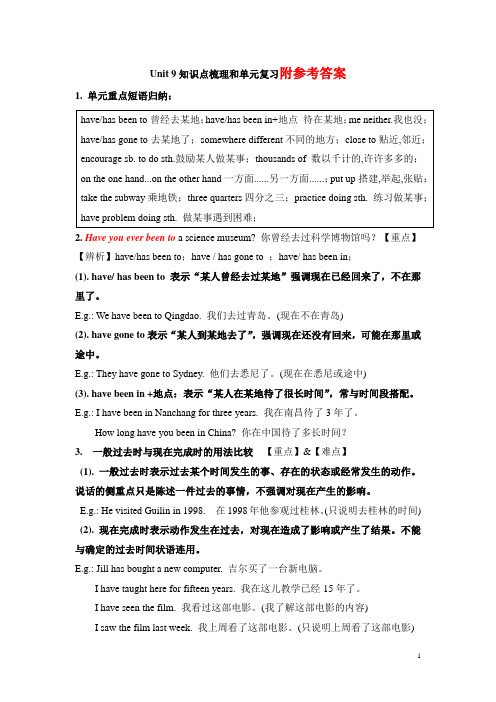
Unit 9知识点梳理和单元复习附参考答案1. 单元重点短语归纳:have/has been to曾经去某地;have/has been in+地点待在某地;me neither.我也没;have/has gone to去某地了;somewhere different不同的地方;close to贴近,邻近;encourage sb. to do sth.鼓励某人做某事;thousands of 数以千计的,许许多多的;on the one hand...on the other hand一方面......另一方面......;put up搭建,举起,张贴;take the subway乘地铁;three quarters四分之三;practice doing sth. 练习做某事;have problem doing sth. 做某事遇到困难;2. Have you ever been to a science museum? 你曾经去过科学博物馆吗?【重点】【辨析】have/has been to;have / has gone to ;have/ has been in;(1). have/ has been to 表示“某人曾经去过某地”强调现在已经回来了,不在那里了。
E.g.: We have been to Qingdao. 我们去过青岛。
(现在不在青岛)(2). have gone to表示“某人到某地去了”,强调现在还没有回来,可能在那里或途中。
E.g.: They have gone to Sydney. 他们去悉尼了。
(现在在悉尼或途中)(3). have been in +地点:表示“某人在某地待了很长时间”,常与时间段搭配。
E.g.: I have been in Nanchang for three years. 我在南昌待了3年了。
How long have you been in China? 你在中国待了多长时间?3. 一般过去时与现在完成时的用法比较【重点】&【难点】(1). 一般过去时表示过去某个时间发生的事、存在的状态或经常发生的动作。
河南省八年级英语下册Unit9Haveyoueverbeentoamuseum必考知识点归纳

河南省八年级英语下册Unit9Haveyoueverbeentoamuseum必考知识点归纳单选题1、The Great Wall is a place of interest. All of us ________ there before.A.has beenB.have beenC.has goneD.have gone答案:B句意:长城是个名胜古迹。
我们所有人以前都去过那里。
考查现在完成时。
have/has been表示去过某地又回来了;have/has gone表示去了某地还没回来。
主语“All of us”是复数,用have而不用has,排除AC;根据before可知应该是去过,现在已经回来,用have been而不用have gone,排除D。
故选B。
2、—I have ________ been to Tibet. How about you?—Me. neither.A.neverB.everC.already答案:A句意:--我从没去过西藏。
你呢? --我也没有去过。
根据neither “我也没有去过”提示,可知问句是没去过,never从不,ever曾经,already已经;故选A。
3、David has never been to Australia, ________?A.hasn’t heB.doesn’t heC.has heD.does he答案:C句意:大卫从未去过澳大利亚,是吗?考查反义疑问句。
题干中“has never been”是现在完成时,助动词为has,never表否定。
反义疑问句中如果陈述句为否定,反义疑问句的后半部分应用肯定疑问句。
故选C。
4、— ________ you ever ________ to Hong Kong?— Yes, only once.A.Did; goB.Have; goneC.Do; goD.Have; been答案:D句意:——你去过香港吗?——是的,只有一次。
unit9haveyoueverbeentoamuseum教案
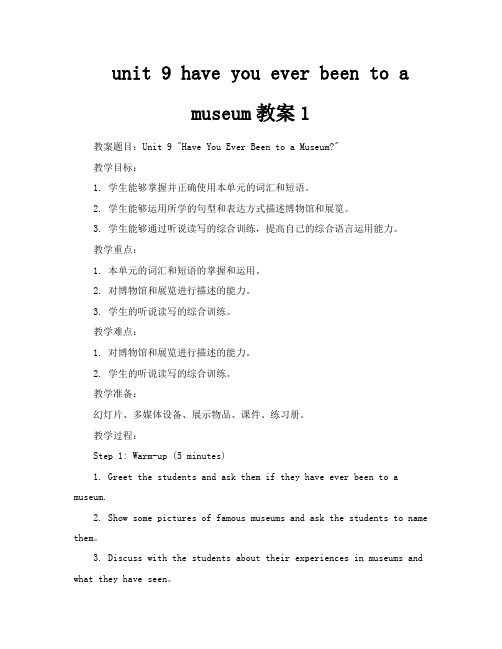
unit 9 have you ever been to amuseum教案1教案题目:Unit 9 "Have You Ever Been to a Museum?"教学目标:1. 学生能够掌握并正确使用本单元的词汇和短语。
2. 学生能够运用所学的句型和表达方式描述博物馆和展览。
3. 学生能够通过听说读写的综合训练,提高自己的综合语言运用能力。
教学重点:1. 本单元的词汇和短语的掌握和运用。
2. 对博物馆和展览进行描述的能力。
3. 学生的听说读写的综合训练。
教学难点:1. 对博物馆和展览进行描述的能力。
2. 学生的听说读写的综合训练。
教学准备:幻灯片、多媒体设备、展示物品、课件、练习册。
教学过程:Step 1: Warm-up (5 minutes)1. Greet the students and ask them if they have ever been to a museum.2. Show some pictures of famous museums and ask the students to name them。
3. Discuss with the students about their experiences in museums and what they have seen。
Step 2: Presentation (15 minutes)1. Present the new vocabulary and phrases related to museums and exhibitions using flashcards or pictures。
2. Introduce the target language structures through a short dialogue between a student and a teacher, using phrases like "Have you ever been to a museum?" and "What did you see there?"3. Model the pronunciation and intonation of the target language structures and have the students repeat after you。
八年级英语下册 Unit 9 Have you ever been to a museum语法专题—

3.—Have you seen Dr.Qian recently? —No.He _C___ Japan for an important meeting.He'll come back next week. A.has gone B.has been to C.has gone to D.has been 4.—Have you __C__ been to Guangxi? —Yes,I have.I ________ there last summer. A.ever;go B.never;went C.ever;went D.never;go
第8页
9.We went to the science museum last week.(对画线部分提问) ___W__h_e_n__d_id___ you __g_o_ to the science museum? 10.My parents have been to the Great Wall.(对画线部分提问) __W__h_e_r_e_h_a_v_e__ your parents__b_e_e_n___?
第9页
三、依据对话内容,用have/has been(to)或have/has gone(to)填空。 A:Hi,Roger! Where is everybody?The house is very quiet. B:Well,Mom 11.__h_a_s__g_o_n_e_t_o____ the cinema with Jane. A:How about your sister? B:She's taking a shower right now because she 12.__h_a_s_b_e_e_n__to__ the gym(健身房). A:I 13._h__a_ve__b_e_e_n_t_o__ the gym twice this week.It's really tiring.
英语八年级下册 Unit9 Have you ever been to a museum单元短语过关

人教版英语八年级下册第九单元短语过关Unit 9 Have you ever been to a museum?1. a science museum 一个科学博物馆2. a space museum 一个太空博物馆3. a history museum 一个历史博物馆4.an art museum 一个艺术博物馆5.water park 水上乐园6.amusement park 游乐场7.somewhere different 某个不同的地方;不定副词,后接形容词;例如:For my next vacation , I ‘d like to go somewhere different. 下次度假,我想去个不同的地方。
st year 去年9.at night在夜晚;at noon在中午10.have \ has been to ... 去过...;例如:I have been to a wonderful placewith big gardens. 我去过一个带有很多花园的美景之地。
have \ has gone to ... 去了;例如:She can’t find Mr. Green , he has gone to Beijing. 她不能找到格林先生,他去了北京。
11.go skating 去滑冰12.take the subway 乘坐地铁13.camp in the mountains 在山上野营;例如:During the summervacation , we camped in the mountains and it was fun. 暑假期间,我们在山上野营,非常有趣。
14.put up the tent 搭建帐篷;put up 还可以表示张贴;例如:They putup their tent and slept under the tree.他们搭建好帐篷,在树下睡了。
河南省八年级英语下册Unit9Haveyoueverbeentoamuseum解题方法技巧

河南省八年级英语下册Unit9Haveyoueverbeentoamuseum解题方法技巧单选题1、—Hi, Tom! _________ you ever _________ the Bird’s Nest?—Yes, I have. It’s fantastic.A.Have; been toB.Have; gone toC.Did; go to答案:A句意:——嗨!汤姆!你去过鸟巢吗?——是的,我去过。
那太棒了!考查现在完成时。
由答语“Yes, I have.”可知,问句用现在完成时,排除C项;have been to表示“曾经去过某地(现在已经回来了)”;have gone to表示“去了某地(还没有回来)”。
分析语境可知,此处是问“你曾经去过鸟巢吗?”,应用have been to。
故选A。
2、—Do you like English?—Yes, but I think__________ is a great challenge to learn the language well.A.thatB.thisC.it答案:C句意:——你喜欢英语么?——是的,但是我认为把语言学好是一种挑战。
考查代词。
that那个;this这个;it它。
think后是省略that的宾语从句,不定式“to learn the language well”是从句的真正的主语,此处用it做宾语从句的形式主语。
故选C。
3、—Where’s your English teacher?— She ________ to Beijing. She’ll be back in a week.A.has beenB.has goneC.goesD.went答案:B句意:——你的英语老师在哪儿?——她去了北京。
她将在一周后回来。
考查动词时态。
have been to…“去过某地”;have gone to…“去了某地”,根据“She’ll be back in a week.”可知,她去了北京,现在不在这儿,用“have/has gone to +地点”来表示。
八年级英语下册Unit9Haveyoueverbeentoamuseum单元语法知识梳理人教版

Unit 9 Have you ever been to a museum现在完成时(Ⅱ)1.现在完成时表示经历的用法现在完成时常用have been to(去过),ever(曾经),never(从没)等表示经历。
用法说明示例have / has been to表示去过某地,可以与never,ever,just,once等连用。
Mr. Smith has ever been to China three times.史密斯先生曾去过中国三次。
ever常用于现在完成时的一般疑问句中,放在主语之后,过去分词之前。
Have you ever visited the Palace Museum? 你曾参观过故宫博物馆吗?never表示否定,用在助动词have / has之后,过去分词之前。
表示否定的简短回答可以用neither。
—I have never been to Hong Kong.我从来没去过香港。
—Me neither.我也没去过。
2.have/ has been to与have / has gone to的用法区别用法说明示例have/ has been to意为“去过某地”,表示去过某地,现在已经回来了,通常与表示次数的状语连用,如twice,several times,ever,never等She has been to Europe twice.她去过欧洲两次。
(已经回来了)I have never been to the Great Wall.我从未去过长城。
have / has gone to意为“去了某地”,表示到某地去了,强调说话时去某地的人不在场(可能在途中,也可能已到达)。
—Where is Jim? 吉姆在哪里?—He has gone to England.他去英国了。
(现在不在这里)若have/ has been to或have / has gone to后接副词,则省略to。
Have you ever been to a museum_知识点汇总-人教版英语八年级下册

Unit 9 Have you ever been to a museum?一、短语归纳1.science museum科学博物馆2.history museum历史博物馆3.space museum 太空博物馆4.art museum美术馆5.water park水上公园6.amusement park游乐场7.somewhere different某个不同的地方8.have a great time玩得高兴9.take the subway乘地铁10. learn about了解11.put up搭建;支起12. color movies彩色电影13. a great way to do sth一个做某事的好方式/好方法14.in such a rapid way用如此快速的方式15.It’s unbelievable that:很难相信16.be able to do sth能够做某事17.think about 考虑18.many different kinds of许多不同种类的19. in the future在将来未来20. a couple of 少数;几个21.a perfect cup of tea一杯完美的茶22. something important重要的东西23.thousands of数以千计的24. watch sb. do sth观看某人做了某事25.want to do sth想要做某事26.encourage sb. to do sth鼓励某人做某事27.love doing sth喜欢做某事28.see sb doing sth看见某人正在做某事29.the best time to do sth做某事的最佳时间30.have problems (in) doing sth做某事有困难31. choose to do sth选择做某事32. tell sb. to do sth告诉某人做某事33.take a holiday度假34. at night 在晚上35. more than 超过;多于36.three quarters 四分之三37. on the one hand…on the other hand 一方面…另一方面38. an English-speaking country一个说英语的国家39. during the daytime 在白天40. wake up 醒来41. all year around一年到头42.close to靠近43. far from离…远44. the Great Wall长城45.the best time to do sth做某事的最好方式考点归纳考点1 辨析:have/ has been to have gone to have been in⑴have/ has been to + 地名“曾经去过某地” , 现在已经回到原地。
八年级下册Unit 9 Have you ever been to a museum要点讲解
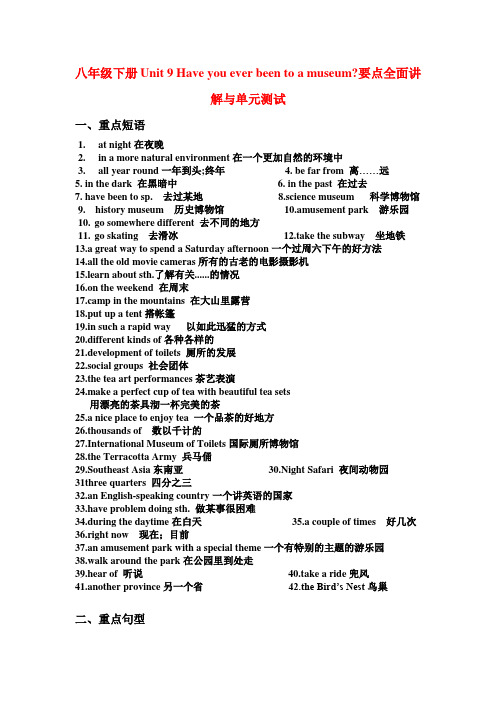
八年级下册Unit 9 Have you ever been to a museum?要点全面讲解与单元测试一、重点短语1.at night在夜晚2.in a more natural environment在一个更加自然的环境中3.all year round一年到头;终年4. be far from 离……远5. in the dark 在黑暗中6. in the past 在过去7. have been to sp. 去过某地8.science museum 科学博物馆9.history museum 历史博物馆10.amusement park 游乐园10.go somewhere different 去不同的地方11.go skating 去滑冰12.take the subway 坐地铁13.a great way to spend a Saturday afternoon一个过周六下午的好方法14.all the old movie cameras所有的古老的电影摄影机15.learn about sth.了解有关......的情况16.on the weekend 在周末17.camp in the mountains 在大山里露营18.put up a tent搭帐篷19.in such a rapid way 以如此迅猛的方式20.different kinds of各种各样的21.development of toilets 厕所的发展22.social groups 社会团体23.the tea art performances茶艺表演24.make a perfect cup of tea with beautiful tea sets用漂亮的茶具沏一杯完美的茶25.a nice place to enjoy tea 一个品茶的好地方26.thousands of 数以千计的27.International Museum of Toilets国际厕所博物馆28.the Terracotta Army 兵马俑29.Southeast Asia东南亚30.Night Safari 夜间动物园31three quarters 四分之三32.an English-speaking country一个讲英语的国家33.have problem doing sth. 做某事很困难34.during the daytime在白天35.a couple of times 好几次36.right now 现在;目前37.an amusement park with a special theme一个有特别的主题的游乐园38.walk around the park在公园里到处走39.hear of 听说40.take a ride兜风41.another province另一个省42.the Bird’s Nest鸟巢二、重点句型1. Have you ever been to... ?Have you ever been to a science museum? 你曾经去过科学博物馆吗?2. Let’s do sth 让我们一起去做某事吧Let’s go somewhere different today.我们今天去个不同的地方吧。
Unit_9_Have_you_ever_been_to_a_museum-_SectionA1

water park _____ 2
3 zoo _____
1 amusement park _____
1b. Listen. Have these students ever been to these places? Check (✓) the boxes.
Anna: So, what did you do on the weekend?
Jill:
I camped in the mountains with some
friends. We put up a tent and cooked outside.
Anna: That sounds fun. I’ve never been camping. Jill: You should try it!
2a. Look at the map of the town. Listen and circle the places you hear.
2b. Listen again and circle T for true or F for false. Conversation 1
1. Tina went to the space museum last year. T/F 2. John has never been to the space museum. T/F 3. They are going to take the subway. T/F
比较 have/has been to
He has been to Shanghai. 他(曾经) 去过上海。
比较 have/has been to have/has gone to He has gone to Shanghai. 他(已经)去上海了。
- 1、下载文档前请自行甄别文档内容的完整性,平台不提供额外的编辑、内容补充、找答案等附加服务。
- 2、"仅部分预览"的文档,不可在线预览部分如存在完整性等问题,可反馈申请退款(可完整预览的文档不适用该条件!)。
- 3、如文档侵犯您的权益,请联系客服反馈,我们会尽快为您处理(人工客服工作时间:9:00-18:30)。
Unit9 Have you ever been to a museum?Have you ever been to a space museum?Have you ever been to a history museum?Have you ever been to an art museum?Have you ever been to a water park?Have you ever been to a zoo?Have you ever been to an amusement park?1. 句型结构:have / has +done①肯定句:主语+have/has+动词过去分词+宾语(其中have/has为助动词,have 的主语为I, you, they, we, has的主语为he,she,it,等单数名词或代词)②否定句:主语+have/has not+动词的过去分词+宾语(缩写形式分别为haven’t和hasn’t)③一般疑问句:Have/Has+主语+动词的过去分词+宾语④特殊疑问句:特殊疑问词或词组+一般疑问句(have/has+主语+过去分词+其他)2.基本用法①表示过去发生或已完成的某个动作对现在产生的影响或结果,强调的是这个影响或结果,常同already, just, yet等状语连用I have just turned off the light. 我刚刚把灯关上。
(结果是灯已经关上了)She has lost her bike.她把自行车丢了。
(影响是他现在没有自行车骑了)The rain has stopped now.雨已经停了。
(结果是我们可以出门了)I have already read the book.我已读过这本书了。
(结果是已知道这本书的内容)She has had a good education.她受到过良好的教育。
(影响是她文化水平高,有修养)②表示开始于过去、持续到现在的动作或状态,并可能继续下去,常同包括现在在内的时间状语连用,如:today, now, this week, this morning, these days, this afternoon, recently, so far等;也同“for+时间段”或“since+时间点”的状语连用We have had much snow this winter. 今年冬天多雪。
She has taught in the school for ten years.她在这所学校教书已经10年了。
I haven't eaten anything since breakfast.我从早饭起就一直没有吃东西。
We have been busy this morning.今天上午我们一直很忙。
I have known her since we were children.我从小就认识她。
I haven't seen John today.我今天没有见到约翰。
It has rained a lot these days.这些天多雨。
③表示从过去某一时间到说话时这段时间中反复发生的动作或多次动作的总和,常同频度副词always, often, seldom, never等连用He has done a lot of work in the past two years. 在过去两年中他做了许多工作。
I have learned about two hundred English words this morning.本月我学了大约200个英语单词。
I have been to the Great Wall twice.我曾经去过长城两次It has rained every day this week.这个星期天天下雨。
She has always walked to school.她一直步行去学校。
I have never seen such a beautiful bird.我从没见过这么美丽的鸟。
I have often met the old man on my way to work.我在上班的路上常常遇见那位老人。
3. be的现在完成时态①可表示一种状态,表示从过去已经开始持续到现在,要与表示一段的时间状语连用。
There has been a factory near No. 14 Middle School for several years.十四中学附近有家工厂,已经有几年了.②后加地点, 表示某人曾经到过某地.Have you ever been to West Hill Farm?你曾经到过西山农场吗?4.一般过去时与现在完成时的区别①. 标志词不同(具体看两种时态标志词) 如:I went to cinema two days ago. (一般过去时标志词).He has been away since ten days ago. (现在完成时的标志词)②. 一般过去时表示动作发生在过去,与现在无关。
而现在完成时表示动作发生在过去,对现在造成影响。
I saw the film yesterday. (我昨天看过电影,现在看不看不知道)I have seen the film before. I won’t see it again. (过去看过电影,对现在有影响,不想再看了)5. 难点考点①. 现在完成时可和疑问词where, why, how 连用,但不能和when连用.故现在完成时对时间的提问不用when,只用how long。
Where have you been? Why have you turned off the radio? Whenhave you come back? (×)He has been in China for 4 years. (提问) When(×) / How long(✓) has he been in China?②. have been to(去了某地又回来)/ have gone to(去了没回来) / have been in (去了并在那里呆下去)I have been to Beijing twice.–Where is Tom? –He has gone to HK.Lucy has been in this school for two years.③.短暂性动词和持续性动词的现在完成时A.若后面没有时间状语“for + 时间段,since + 时间点”时,短暂性和持续性动词都可用于现在完成时。
如:I have bought(短暂) a new computer. (✓) He has already lived (持续) in the small village. (✓)B. 若后面有时间状语“for + 时间段,since + 时间点”时,要用持续性动词或短暂性动词的否定。
如:They have stayed (持续) in the village for 10 years.I have taught(持续) English at this school since 5 years ago.You haven’t received (短暂)her letter for 2 weeks.We haven’t left (短暂)China since 20 years ago.C. 短暂性动词的肯定不能与“for + 时间段,since + 时间点”连用,若要和他们连用则要将短暂性动词变为相对应的动词。
如:I have come here for 3 years. (×)→I have been here for 3 years.( ✓)现举例说明这类动词的变化:下划线的词是错的,括号里的词是对的,borrow / lend→ kept She has borrowed(kept) the magazine since two weeks ago.catch→ had Kate has caught (had) a cold for one day.buy→ had I’ve bought (had) this radio for 3 years.put on → worn He has put on (worn) the new coat for a week.leave / go→been away They have left(been away) for one year.start / begin→ been on The film has begun (been on) for 8 minutes.get up→ been up He has gone up(been up) more than two hours.move→ been out (of) Jim’s family have moved(been out of) here for over 2 years.finish→ been over The football match has finished(been over) for two hours.open→ been open The factory h as opened(been open) since 1990.close→ been closed The factory has closed (been closed) for 2 months.die→ been dead That old man has died(been dead)for three years.join→ been in/ been a member (of) Her father h as joined (been in) the Party for ten years.come/ become/ arrive→been(in) They have come to(been in) this school since 1990.6.趣味英语西蒙说(Simon says)教师在发出指令前可以说“Simon says”,也可以不说。
如说:“Simon says, touch your nose.”或“Touch your nose.”。
如指令前有“Simon says”,则学生做此动作,指令前没有“Simon says”学生便不做此动作。
如教师说“Touch your nose.”,而学生做了摸鼻子的动作,便算错了,要扣分。
